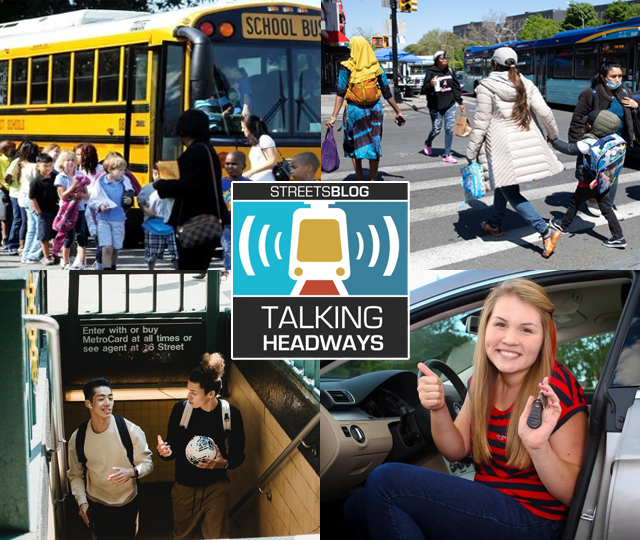This week we’re joined again by Dr. Jennifer Kent, senior research fellow in Urbanism at the University of Sydney, to talk about her work on family transportation, the messiness of travel for parents, and loneliness and the built environment. She also shares what parents might need to travel more sustainably.
The text of a portion of the interview is available below. Click here for a full, unedited transcript.
Jeff Wood: And then there's the transitory nature of childhood. Children grow up and get more abilities, which may or may not mean less or more travel for them or independent travel for them. They're changing grades, you know, going to different schools, those types of things. And so, you know, through the, the 18-year journey of childhood and adolescence, there’s sub-journeys, and those-sub journeys have different transport needs as you move through the life of a of a child.
Jennifer Kent: Yeah, absolutely. We like to think that once a person has made a decision about the way they will travel, that that will be ingrained and entrenched. But with families that changes from, you know, year to year, week to week, day to day, hour to hour sometimes. At every stage of that we need to be pushing for the sustainable transport option over the private car.
One thing I’m really interested in is the way that the car sort of becomes entrenched in family life because it was relevant for one particular aspect. So, you know, a family might have been able to be car-free up until the child hits that period of time when they’re interested in extracurricular activities, they’ve got family, they’ve got friends all over the place that they want to visit. So the car becomes more important. Because the car is such a useful tool, it becomes entrenched in the family’s routine even after that period where the child is dependent on the car for mobility.
So the child may become more independent but the car stays in the family because it’s become such an important tool in the way that that family works. And then even when the child may move out at home, the couple finds themselves more car dependent than what they were before parenthood because they’ve got used to the autonomy and the flexibility and so forth that the car can bring them. So again, there’s all these sort of intervention points that I don’t think we really take account of when we’re thinking about the way that people might travel throughout their entire, you know, lives.
Jeff Wood: I’m thinking about the sunk cost of a car, right? You purchase a vehicle, whether it’s a used one or or a new one, it’s a significant investment, 10 to 20 to $30,000 and maybe even more depending, you know, on your station in life and how much you feel like you can afford. And then as you go through those stages where you actually did need it, you actually find yourself maybe using it for other things, that — it’s there, so you use it. But maybe you didn’t do that before, like you said. That's interesting as an inflection point for determining whether you can use sustainable transportation or not or whether you will.
One of the reasons I got rid of my car was because I kept on leaving it and getting parking tickets and the clutch was going bad. It was the dawn of Zipcar and Uber and all those other things and I was like, "Well, I think I could do this as a single person living my own life," but I can imagine if you decided to get another car because you needed it or you had a kid or something along those lines, that car stays with you for 10, 15 years.
Jennifer Kent: Absolutely. A couple of things came up for me as you were talking. I think when the car sits there, you feel like you need to use it, or you get really accustomed to the autonomy that it can bring and you lose the skills of being able to plan a little bit ahead that, you know, more sustainable transport might require. I think that’s why car sharing schemes work so well — because it makes every single trip a real decision point, not just something that becomes automated or out of habit. And that’s a lot to do with the success in car sharing and reducing VKT or VMT and reducing car ownership.
The other thing that came to mind, though, is the work of sociologist Margaret Archer, whose got this great quote saying that we can sit here planning for an outcome that we’re after — while all the while putting in policies that are actually doing the exact opposite thing. It just draws out that idea that there’s this temporal lag. I think of the way that we think about climate change, the way that we think about other aspects of sustainability and the policies that we’re actually putting in place or the practices on a personal level that we’re actually doing. And I worry about that because we’re running out of time. We need to start getting things happening, as you know, but this nature of the temporal lag, these investments that cement you into a certain way of traveling become really costly.
Jeff Wood: Over time it adds up, especially if it’s a decade time period. That’s such a long time. It’s not a year or two years.
Jennifer Kent: It's not. The investment of a car isn’t just for 10 years. You’re actually socializing the child into that expectation of the autonomy that comes with the car and de-skilling them with taking public transport, using bikes and, and walking and so forth. So the temporal implications of that are augmented, you know, generation after generation. That’s how we’ve ended up where we are.






